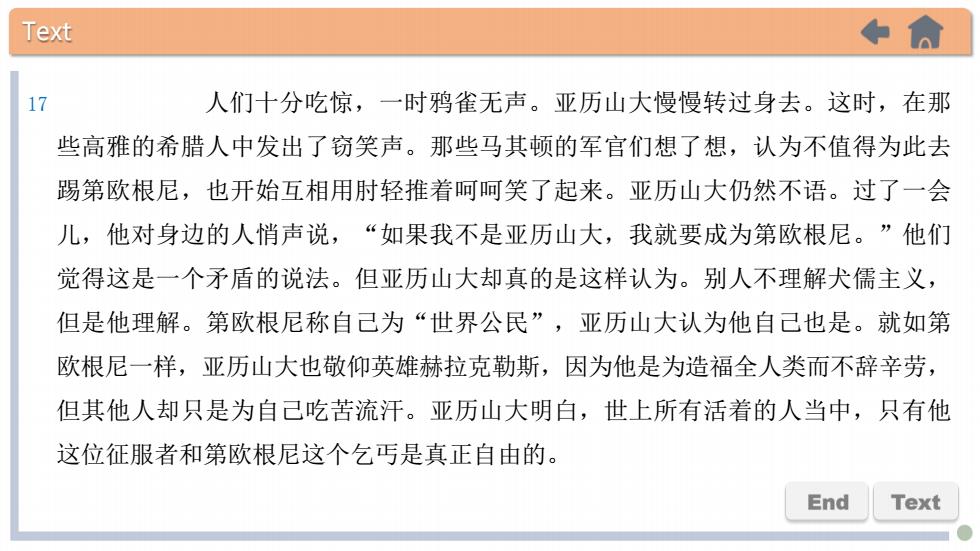
+食Text17人们十分吃惊,一时鸦雀无声。亚历山大慢慢转过身去。这时,在那些高雅的希腊人中发出了窃笑声。那些马其顿的军官们想了想,认为不值得为此去踢第欧根尼,也开始互相用肘轻推着呵呵笑了起来。亚历山大仍然不语。过了一会儿,他对身边的人悄声说,“如果我不是亚历山大,我就要成为第欧根尼。”他们觉得这是一个矛盾的说法。但亚历山大却真的是这样认为。别人不理解犬儒主义,但是他理解。第欧根尼称自已为“世界公民”,亚历山大认为他自已也是。就如第欧根尼一样,亚历山大也敬仰英雄赫拉克勒斯,因为他是为造福全人类而不辞辛劳,但其他人却只是为自已吃苦流汗。亚历山大明白,世上所有活着的人当中,只有他这位征服者和第欧根尼这个气是真正自由的。EndText
17 人们十分吃惊,一时鸦雀无声。亚历山大慢慢转过身去。这时,在那 些高雅的希腊人中发出了窃笑声。那些马其顿的军官们想了想,认为不值得为此去 踢第欧根尼,也开始互相用肘轻推着呵呵笑了起来。亚历山大仍然不语。过了一会 儿,他对身边的人悄声说, “如果我不是亚历山大,我就要成为第欧根尼。 ”他们 觉得这是一个矛盾的说法。但亚历山大却真的是这样认为。别人不理解犬儒主义, 但是他理解。第欧根尼称自己为“世界公民” ,亚历山大认为他自己也是。就如第 欧根尼一样,亚历山大也敬仰英雄赫拉克勒斯,因为他是为造福全人类而不辞辛劳, 但其他人却只是为自己吃苦流汗。亚历山大明白,世上所有活着的人当中,只有他 这位征服者和第欧根尼这个乞丐是真正自由的。 Text
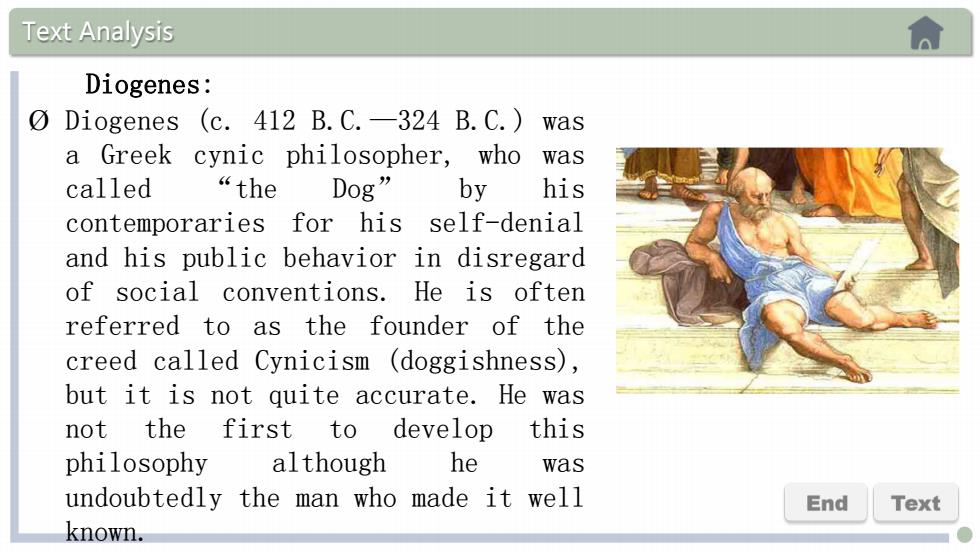
Text Analysis0Diogenes:O Diogenes (c. 412 B. C. —324 B. C.)wasa Greek cynic philosopher,who was“theDog”calledbyhiscontemporaries forhis self-denialand his public behavior in disregardof social conventions.He is oftenreferred to as the founderof thecreed called Cynicism (doggishness),but it is not quite accurate. He wasnotthefirsttodevelopthishealthoughphilosophywasundoubtedly the man who made it wellEndTextknown
Diogenes: Ø Diogenes (c. 412 B.C.—324 B.C.) was a Greek cynic philosopher, who was called “the Dog” by his contemporaries for his self-denial and his public behavior in disregard of social conventions. He is often referred to as the founder of the creed called Cynicism (doggishness), but it is not quite accurate. He was not the first to develop this philosophy although he was undoubtedly the man who made it well known. Text Analysis
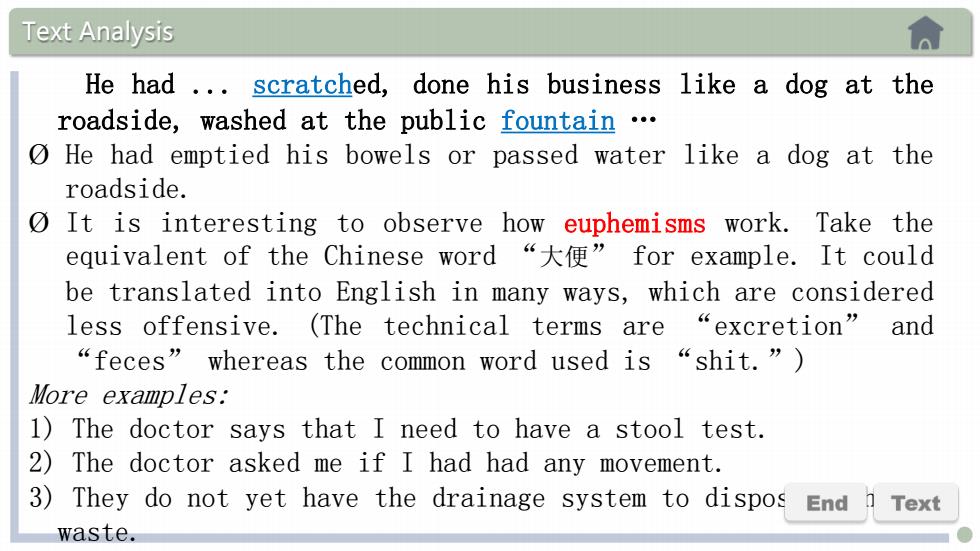
Text Analysis0He had...scratched, done his business like a dog at theroadside, washed atthe public fountain.O He had emptied his bowels or passed water like a dog at theroadside.O It is interesting to observe how euphemisms work. Take theequivalent of the Chinese word“大便”for example.It couldbe translated into English in many ways, which are consideredless offensive.(The technical terms are “excretion"and“feces”whereas the common word used is“shit.”)More examples:1) The doctor says that I need to have a stool test.2) The doctor asked me if I had had any movement.3) They do not yet have the drainage system to dispos EndTextwaste
He had . scratched, done his business like a dog at the roadside, washed at the public fountain . Ø He had emptied his bowels or passed water like a dog at the roadside. Ø It is interesting to observe how euphemisms work. Take the equivalent of the Chinese word “大便” for example. It could be translated into English in many ways, which are considered less offensive. (The technical terms are “excretion” and “feces” whereas the common word used is “shit.”) More examples: 1) The doctor says that I need to have a stool test. 2) The doctor asked me if I had had any movement. 3) They do not yet have the drainage system to dispose of human waste. 4) Chinese peasants used to depend on night-soil for fertilizer. Text Analysis
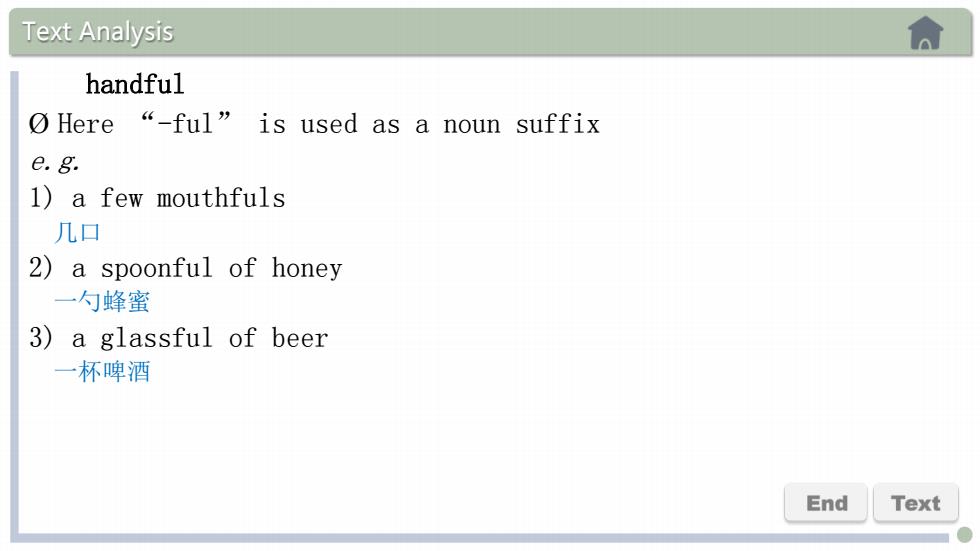
Text Analysis食handful“-ful”O Hereis used as a noun suffixe. g.1) a few mouthfuls几口2) a spoonful of honey一勺蜂蜜3) a glassful of beer一杯啤酒EndText
handful Ø Here “-ful” is used as a noun suffix e.g. 1) a few mouthfuls 几口 2) a spoonful of honey 一勺蜂蜜 3) a glassful of beer 一杯啤酒 Text Analysis
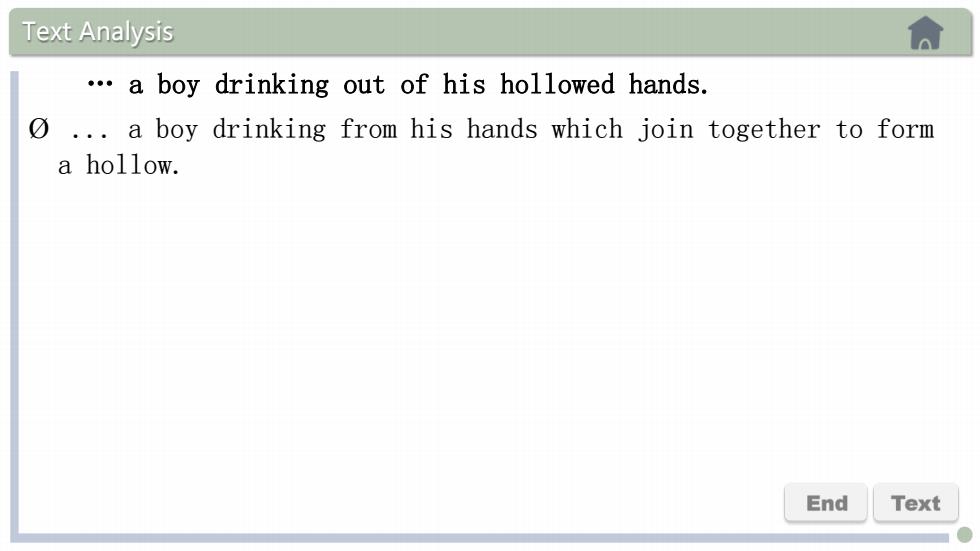
食TextAnalysis... a boy drinking out of his hollowed hands.O ... a boy drinking from his hands which join together to forma hollow.EndText
. a boy drinking out of his hollowed hands. Ø . a boy drinking from his hands which join together to form a hollow. Text Analysis